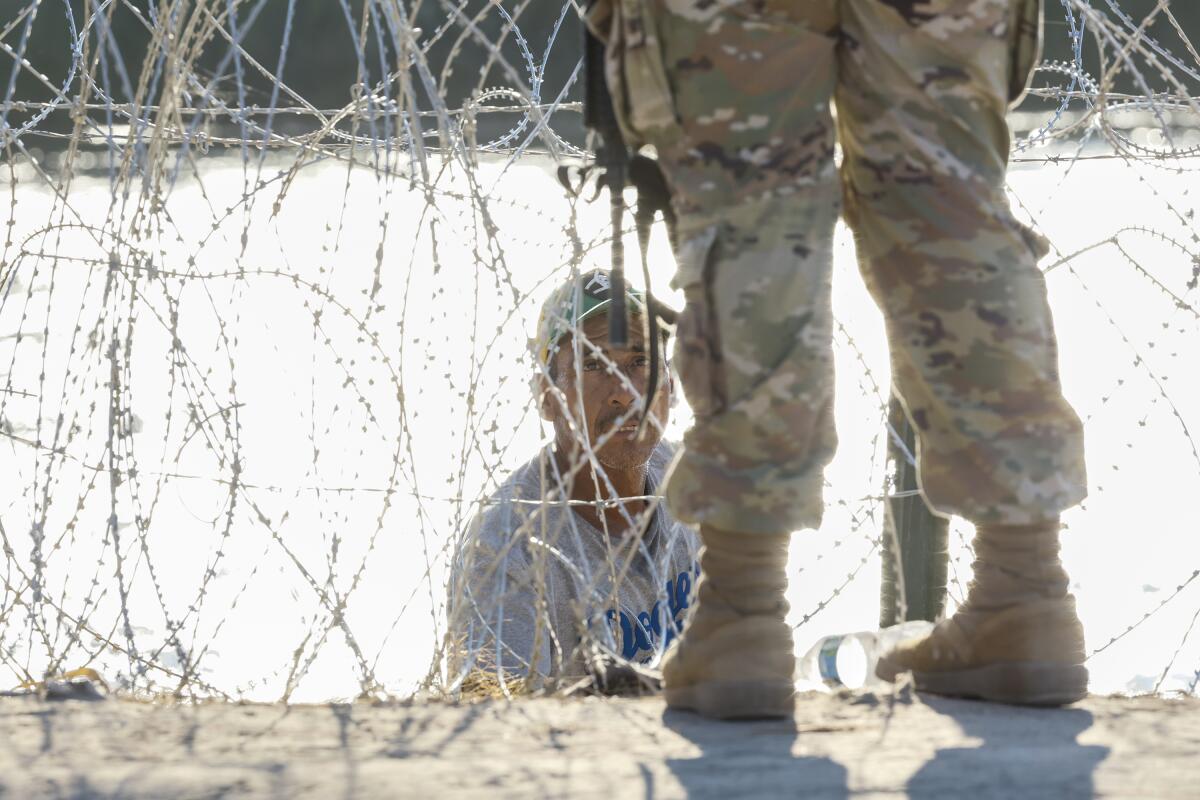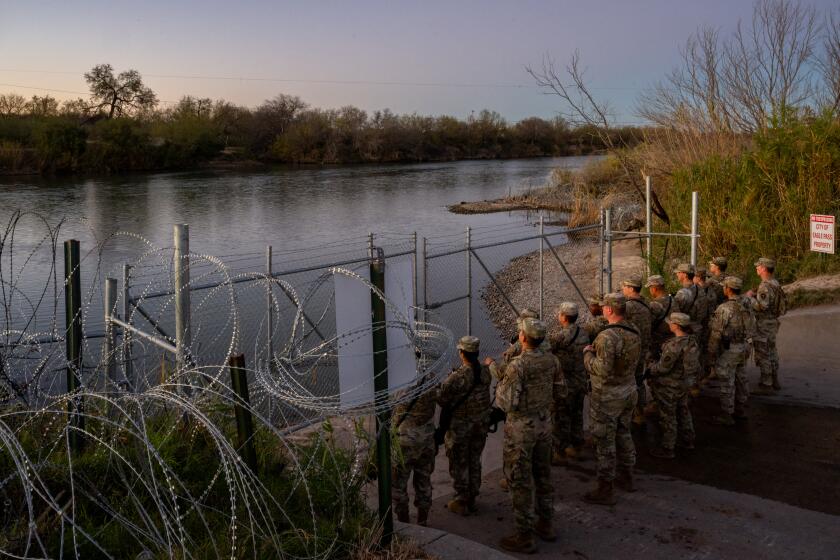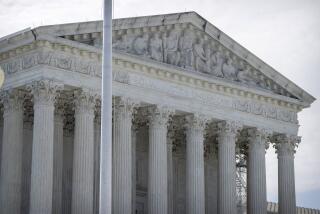Divided Supreme Court clears way for Texas to arrest migrants suspected of illegal entry

WASHINGTON — The Supreme Court on Tuesday turned down a plea from the Biden administration and cleared the way for Texas to begin enforcing a new state law that authorizes its police to arrest migrants who illegally cross the Rio Grande from Mexico.
The decision came on a 6-3 vote, and it may signal a major change in immigration enforcement.
At issue is whether Texas and other red states may strictly enforce laws against coming into the U.S. illegally. Those state leaders say they are acting because of what they view as lax enforcement by the Biden administration.
In her appeal, U.S. Solicitor Gen. Elizabeth Prelogar had argued that the federal government, not the states, has the sole power to decide on the “entry and removal” of people at the borders.
But the justices turned down her appeal without comment and refused to block the Texas law from going into effect.
Texas’ plan to arrest migrants who cross the U.S.-Mexico border illegally is on hold while the U.S. Supreme Court considers a challenge.
The court split along ideological lines in the case, United States vs. Texas. The six conservative justices sided with Texas, while the three liberals voted in favor of the Biden administration’s appeal.
Conservative Justices Amy Coney Barrett and Brett M. Kavanaugh pointed to procedural reasons to explain their vote. They said the conservative U.S. Court of Appeals for the 5th Circuit had yet to rule on the Texas law and that the high court should not weigh in beforehand.
Issuing a strong dissent were liberal Justices Sonia Sotomayor and Ketanji Brown Jackson.
“Today, the Court invites further chaos and crisis in immigration enforcement,” they said. “Texas can now immediately enforce its own law imposing criminal liability on thousands of noncitizens and requiring their removal to Mexico. ... The court confronts a state immigration law that will transform the balance of power at the border and have life-altering consequences for noncitizens in Texas.”
Liberal Justice Elena Kagan dissented separately. She agreed the case was in a “preliminary” posture but said “the entry and removal of noncitizens particularly are matters long thought the special province of the federal government.”
Texas Atty. Gen. Ken Paxton tweeted: “HUGE WIN: Texas has defeated the Biden Administration’s and ACLU’s emergency motions at the Supreme Court. Our immigration law, SB 4, is now in effect. As always, it’s my honor to defend Texas and its sovereignty, and to lead us to victory in court.”
One provision of the law would authorize state judges to deport migrants who were found to have crossed illegally from Mexico.
White House Press Secretary Karine Jean-Pierre said that allowing the Texas law to go into effect “will not only make communities in Texas less safe, it will also burden law enforcement, and sow chaos and confusion at our southern border.”
The federal government warned Texas it had until Wednesday night to stop blocking Border Patrol agents or it would refer the matter to the Justice Department “for appropriate action.”
The law has been seen as a direct challenge to past Supreme Court rulings that upheld the federal government’s near exclusive power over immigration enforcement.
In 2012, justices voted 5 to 3 to block most of an Arizona law that would have given state officials and local police the authority to enforce restrictions on migrants who were “not lawfully present in the United States.” The court said then that federal law preempts or overrides state enforcement that conflicts with federal enforcement.
Texas Gov. Greg Abbott had championed the new state law and argued that Texas has the power as a “sovereign” state to protect itself against what he’s termed an “invasion.” He cited the late Justice Antonin Scalia, a conservative who laid out a similar view in a dissent in 2012, insisting it was a myth that the Constitution gives the federal government exclusive power over immigration.
In defense of their law, known as Senate Bill 4 or SB 4, the state’s attorneys said it does not conflict with federal immigration law, but “mirrors” it.
“SB 4 allows Texas to help enforce federal immigration laws,” they said. “Everyone benefits when Congress’s legislatively chosen priorities are respected.”
They added that “Texas is the nation’s first-line defense against transnational violence and has been forced to deal with the deadly consequences of the federal government’s inability or unwillingness to protect the border.”
On Feb. 29, a federal judge in Austin blocked the law from going into effect on the grounds that it conflicted with federal enforcement. Four days later, a 5th U.S. Circuit Court of Appeals panel in New Orleans lifted that order by a 2-1 vote, with no explanation.
That prompted the Biden administration to go to the Supreme Court. Prelogar said the Texas law was “flatly inconsistent” with the 2012 ruling and could not stand.
“More than a century of this court’s precedents ... recognize that the authority to admit and remove non-citizens is a core responsibility of the national government,” she wrote.
The U.S. Justice Department had argued that if Texas were allowed to enforce its own hard-line immigration policy, it would “create chaos” along the border and “disrupt” relations with Mexico.
But Texas’ lawyers pointed to an increase in the number of migrants crossing the Rio Grande into the U.S., and said smugglers have taken advantage of lax enforcement.
They quoted President Biden’s comments during his State of the Union speech:
“People pay these smugglers $8,000 to get across the border,” he said, because migrants know “if they get by and let into the country, it’s six to eight years before they have a hearing.”
Biden was making a plea for a bipartisan border bill that he said would shorten the delay for asylum hearings and thus reduce incentive for illegal crossings.
The American Civil Liberties Union and immigrants rights groups had also sued to block the Texas law from taking effect, saying it could have a “devastating impact” on migrants and could lead to racial profiling.
The Supreme Court‘s decision Tuesday allows the law to take effect, at least temporarily.
That could potentially change after the 5th Circuit Court hears arguments over the law’s legality on April 3.
More to Read
Sign up for Essential California
The most important California stories and recommendations in your inbox every morning.
You may occasionally receive promotional content from the Los Angeles Times.













